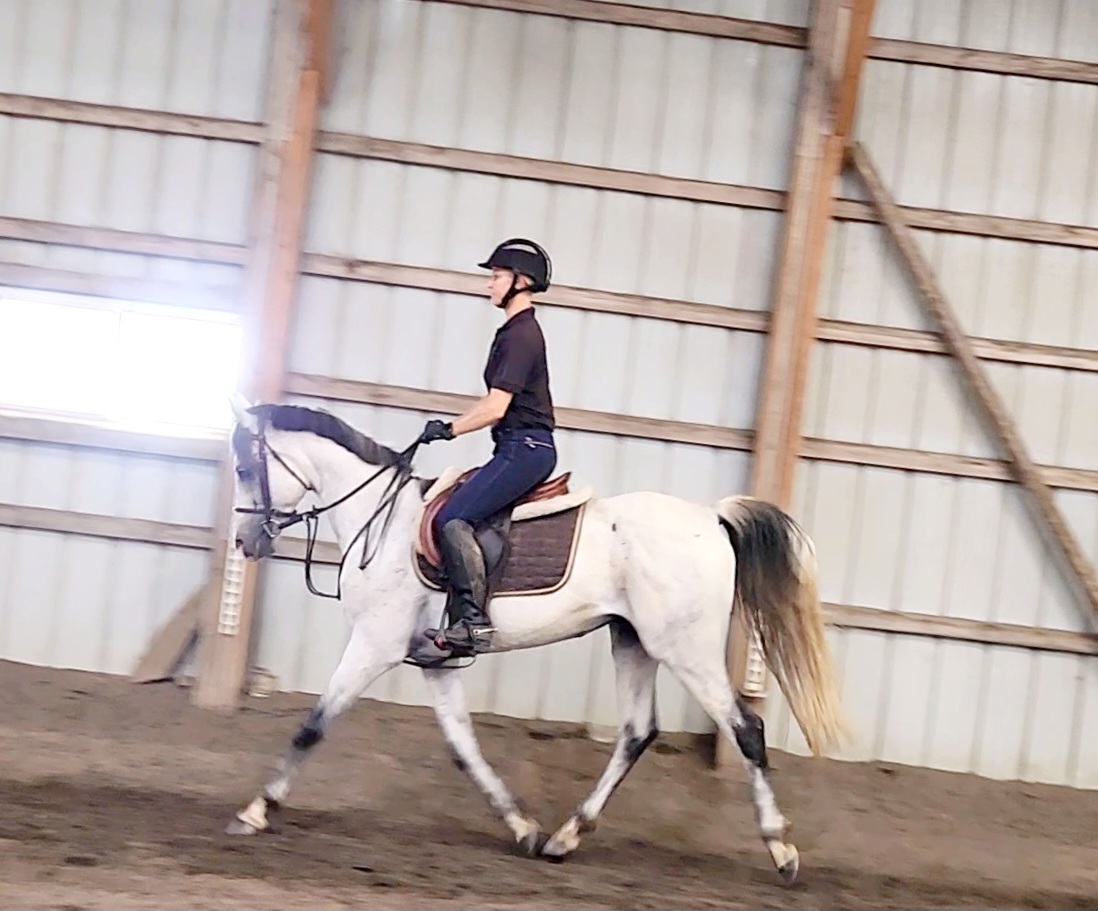When the average person hears that I own a horse, visions of Floridian mansions and champagne bottles at the racetrack pop into their head. While I’m glad that the rich and famous can help fund our sport, that lifestyle is far, far, far from the reality for most eventers. The real lifeblood of eventing is in the everyday person who pays their bills in sweat, blood, and tears. We are a community of hustlers. We are the people who get up early for one job in the morning, work a 9 to 5 during the day, and then head to the barn to muck stalls and hopefully have time to ride the horse we do all this for.
My reality is working full-time running my business and then working at the barn in the evenings to get discounts on my board so I can afford to keep my $500 dollar Off the Track Thoroughbred, and occasionally refinishing and flipping furniture for some spending money. But, I’ve always been curious if there’s a better way to side hustle that could help me not only stay afloat, but get ahead. Who better to ask than other eventers who are side hustling just like me?
We asked our amazing base of eventing fans about how they side hustle and they came through. What an amazing group of hard-working and creative eventers! We’re lucky to have you as our readers.
Make Horse Trials Pay for Themselves
Besides board and vet bills, competing is probably the most expensive part of eventing. These EN readers have found ways to earn money at competitions. From working as a freelance groom to braiding and clipping horses for horse shows, there are quite a few ways you can monetize your time at events.
“I’ve been a professional braider for 13 years. I regularly have 20-25 clients at a horse trials. It’s a great way to meet new people and make friends. 10 years ago, I was braiding their ponies. Now those girls are joining their college eventing teams. And it pays for my entries!” – @harleycoz
“I have a 9-5 desk job (unrelated to horses) that pays for horses, and also allows me to freelance groom at some of the biggest horse shows in the world (including the Paris 2024 Olympic Games)!” – @ wavrykam
“Currently, I’m a groom, vet tech and bartender. On the side, I clip horses, pull manes and braid manes and tails at events. I have a handful of house and farm sitting clients that squeeze in their trips when I’m home from shows. I also teach a bit during camps at my barn.” – Lexie Priest
“I became a XC course designer…” – David Taylor
View this post on Instagram
Turn Another Hobby Into a Side Hustle
Hustlers learn to monetize every aspect of their personality and take their money making talents far beyond the barn. Just like I’m able to sell some furniture on the side (thank you mom and dad for teaching me how), these readers are taking advantage of their other hobbies and skills and putting them to work.
“I work full time at Swarthmore College and The Scott Arboretum as a Garden Supervisor. My side hustle is writing articles for various online and printed publications. I also give gardening talks, floral arrangement demonstrations/classes and teach classes at other public gardens and to garden clubs.” – Adam Glas
“I started selling my art so I could afford to buy and keep a horse, but fifteen years later, it’s grown into my full-time job!” – Aradia Diane Willard
Take Advantage of What The Good Lord Gave You
Plasma. We’re talking about plasma here, folks. Get your heads out of the gutter. I was very curious about this one, so I did a little research. After scrolling a few different websites, it seems like most people get paid around $50 per donation, but you can earn more the more you donate. Some organizations even offer a new donor bonus. Make sure you research the pros and cons of plasma donation and consult your doctor before taking that step.
“It’s all in the plasma! Giving people in need something potentially life saving and in return receiving funds for shows/leases/lessons (life saving for my sanity)” – @ kate.dhuy
Look for Unique Boarding Situations
Have you heard of co-op boarding? Co-op boarding means that all the boarders share the work. Chores are split between the riders and owners, which results in reduced board.
“I’ve always kept my horses at co-op barns. We all shared the chores in exchange for a much lower board rate. Depending on the farm the arrangement varied slightly. Sometimes I was responsible for providing my own hay, sometimes the farm supplied it. I was always responsible for providing my own hay, grain and supplements. The breakdown of chores also varied, but most commonly depending on the number of humans/horses you would be assigned a certain number of chores per week, as would everyone else.” – Becca O’Hurley
“When I was still in uni, I worked at McDonalds to afford horse board. My horse was boarded at a co-op barn, so I was up early cleaning stalls before my classes, then worked at McD’s in the evenings. I was also a working student later on, which I much preferred, as I would rather come home smelling like horses than fried food grease. I worked as a nurse’s aide, government clerk, copy writer/editor, and technical writer. I also worked for several years submitting pharmaceutical reports to FDA.” – Brandi Borkent
View this post on Instagram
Monetize Your Horse Skills
There are lots of different ways to make money within the horse industry. You don’t have to limit yourself to braiding or mucking stalls. These readers took advantage of their more exclusive skills and figured out different ways to turn their equine knowledge into a paying gig.
“I am a realtor and have recently opened my barn to be a horse hotel and have even AirBnB my walkout basement. It’s pretty lucrative so far!” – @ allison_deveraux_murphy
“Where to start? Outside of my regular full-time office job, I clip horses, teach riding lessons, perform PEMF therapy, and have just come up on the 1-year anniversary of my very own online equestrian masterclass program: Equine Academy!” – Michael Willham
“I got trained and certified, and now teach equine health and emergency first aid classes on the weekends. I feel really good about this side hustle because it helps horse owners help their horses when they need it the most. Still have a full time job in addition, and work another side gig helping a professional trainer whenever time allows. I really enjoy volunteering at Galway Downs and try to fit that piece in also. Now to find time for riding. Whew! 😅” – Equine Support Services USA
“Main job – Chartered Accountant. Second job to pay for horse – early mornings at the local race track as a stable hand.” – Larissa Thyne
Work at Your Barn for Reduced Board
This might be one of the most common ways to afford horses. At nearly every barn, you can find a boarder dutifully mucking stalls, emptying water troughs, and generally getting dirty. While situations like this one can be mutually beneficial for both barn owner and boarder, make sure you set boundaries and don’t let yourself work when you’re supposed to be off-duty.
“Work full time for a university, teach riding lessons in the evenings and on weekends, do the late feeding at the barn in the evenings 7 days a week, and never go on vacation (I have 2 horses in the Bay Area 🥴)” – @aen.1984
“I feed and clean stalls at a couple local barns most days of the week, from Sep-Oct I work every weekend on the pony ring at my friend’s pumpkin patch, and sometimes I’m even at my actual full-time office job! 😂” – Paige Stallard
Take Advantage of Your 9 to 5 for Discounts
If you think your vet really gets to bring home the bacon every time you have to call because your horse managed to think up a new creative way to get injured, you’d sadly be wrong. On average, veterinarians still need to hustle to maintain their horse habit. However, one of the big benefits of working in the veterinary field are the discounts.
“I’m a vet, take extra shifts wherever I can, and am forever grateful that I get a staff discount on meds when my horse needs antibiotics for pulling a shoe and stepping on the nail, or wound spray when he cut up his leg jumping into his field after breaking out of his stable, or pain killers for his hoof abscesses, or a steroid injection when he broke out in hives when stung by something at a show, or…. 🤪🤣” – Rebbecca Beckett
“Professionally I am a veterinary technician, which allows me discounted services and medications. On the side I exercise horses, all the extra funds go to pay for my horse’s board and shoeing.” – Stephanie Jones
The Most Unique Side Hustlers are…
These EN readers are really getting creative. I had no idea painting cars and selling chickens and ducks could fund a horse habit! How do you become an electrician on weekends alone? Please, I need more information here.
“Painting Cars!” – Sophie Kelly
“I work every other weekend as an electrician to afford my horses.” – Holly Bordeau
“Training and selling horses; renting dry stalls; breeding and selling chickens, ducks and eggs; selling drag cars and car parts.” – Jennarose Ortmeyer
This article was sponsored by Breeches.com, your go-to store for high-quality tack at affordable prices. I’m not only a hustler in how I get my money, but also in where I spend my money. Discount tack stores are the only place I shop and you’ll never catch me buying anything for full-price. Breeches.com has become my go-to place to shop for great deals, thanks to their amazing clearance section.
View this post on Instagram





















